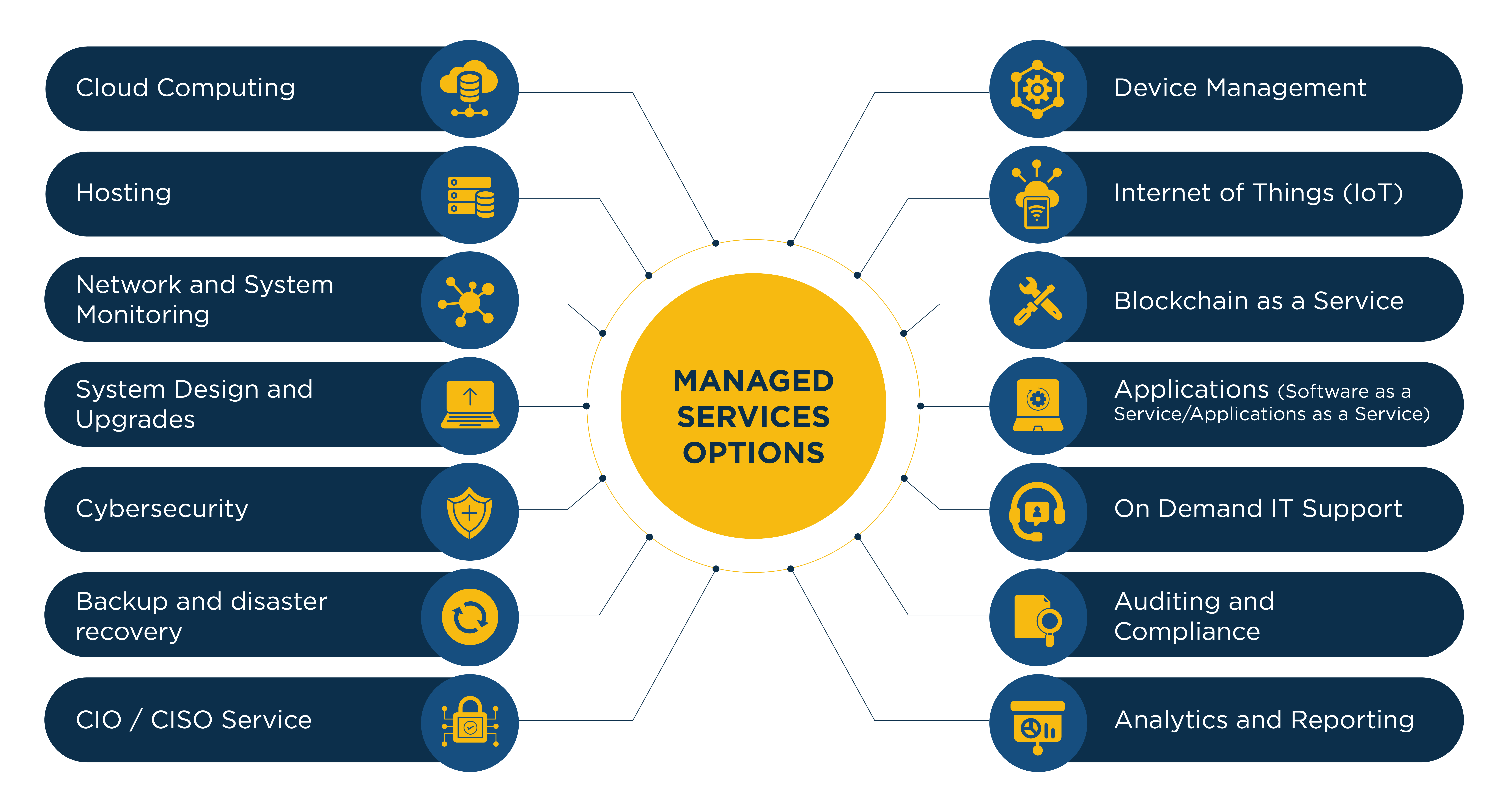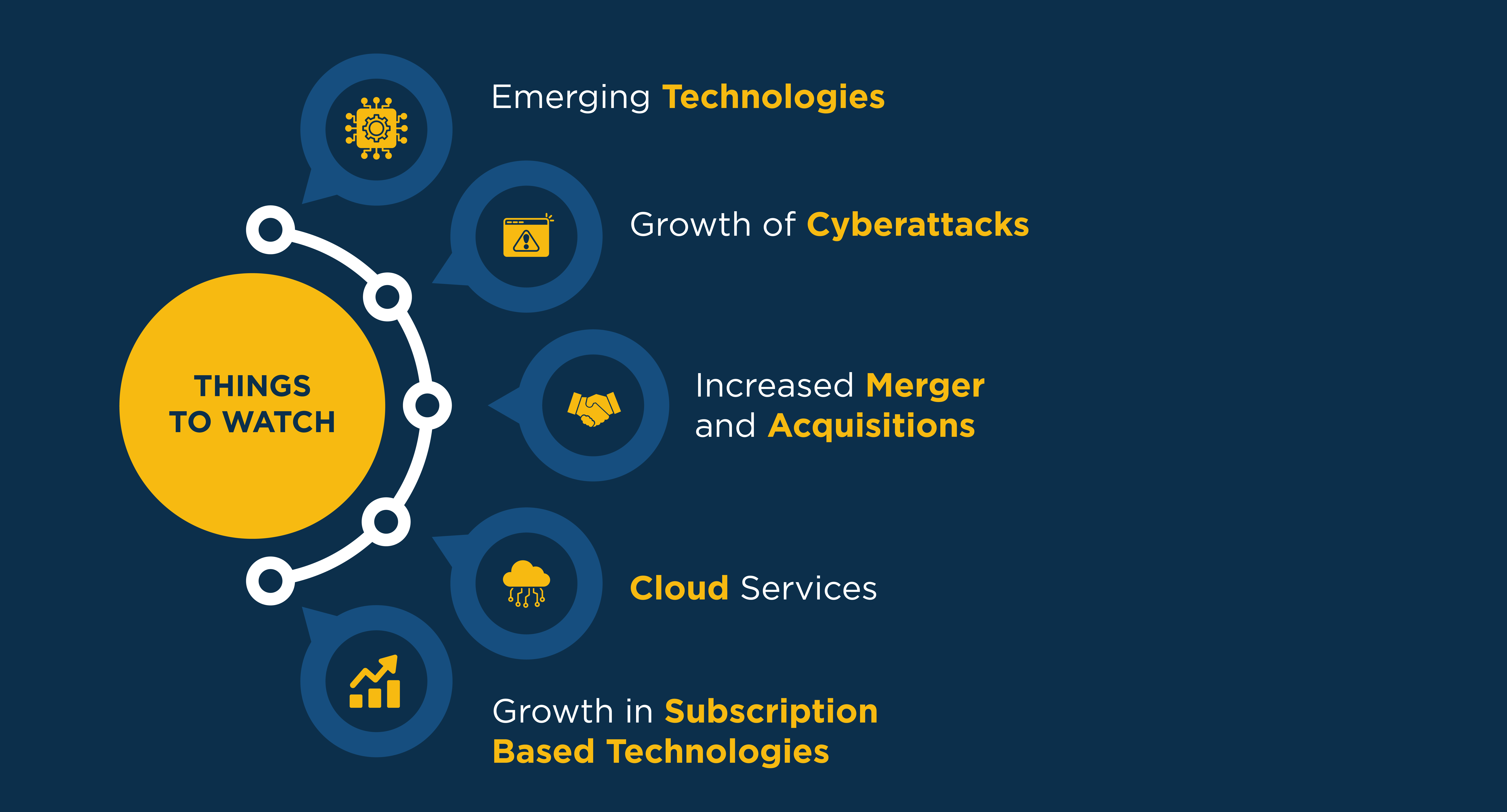What Are Managed Services?
Organizations need the latest tools and superior technology to stay ahead. Keeping up with the latest trends, and using only their internal resources, often makes this unattainable. This is where Managed Services come into play — delegating one, many, or all of the IT organizations to a third-party called Managed Service Providers (MSPs), who are solution experts that provide solutions such as Cybersecurity, Cloud Computing, and the following:

This ongoing and regular support can be actively administered on a customer’s premises, in the MSP’s data center (hosting), or in a third-party data center. Additionally, the MSP may deliver its native services in conjunction with other providers’ services. MSPs often focus on one vendor or technology, while others include services from other Providers or across technology categories. Traditionally, MSPs have focused on infrastructure or device-centric services but have long since expanded to include a wide range of services that deliver regular management, maintenance, and support continuously.
Why You Should Consider Adopting Managed Services
Managed Services have become one of the most popular practices among organizations, particularly Fortune 500 companies. Organizations depend on the MSP to handle their business operations and processes to increase productivity and efficiency. Managed Services demand is largely driven by:
- Increased pressure for organizations to stay updated with the latest technological advancements
- Regulatory compliance demanded by their industry and/or the technology used
- Lack of technical expertise among the internal team in the organization and an inability to attract the required talent (from a very competitive marketplace)
- Awareness of the increase in the number of Cyberattacks
- Specific expertise/technology that is not viable to maintain in-house
- Managed Service Providers ability to provide greater insight and expertise at a predictable monthly cost
When organizations hire and train new internal staff, manage IT equipment, handle Security, or deploy systems on their own, unexpected expenses can come. MSPs help break down these costs into monthly fixed payments and reduce huge in-house expenditures.

Cloud Computing. Organizations can benefit from the flexibility and scalability that comes with adopting Cloud approaches – whether the move is complete, or a gradual stepped approach to transition over time or due to unique situations, like legacy solutions or compliance requirements.
Hosting. This one service can often bleed into others, encompassing a wide array of offerings, including infrastructure components (servers), web hosting, off-site backup, data storage, virtual desktops, related software, databases, and even Cybersecurity.
Network and System Monitoring. One of the most time-consuming tasks for any organization is Network and System monitoring. MSPs can take up this role through a remote monitoring and management platform. This helps organizations focus on optimizing performance and reducing losses by focusing on other important aspects of the organization.
System Design and Upgrades. MSPs work with organizations to understand their unique requirements and fulfill their business objectives – keeping an eye on all the upcoming industry trends and changes in technology to ensure upgrades are done routinely and help the organizations stay ahead of their competition.
Cybersecurity/Security Management. Another essential role of the MSP can be to protect an organization from Cyberattacks by providing regular software patching, testing, training, maintenance, policy development, and other security management services.
Backup and Disaster Recovery. MSPs can also help ensure the integrity and safety of an organization’s data – overseeing practices that maintain adequate backups and position data to be easily recovered in the event of a disaster or Cyberattack.
CIO/CISO Service. Having a solid grasp of security at the C-Suite level can often be tough to acquire. Having elite leadership can provide the vision, expertise, and long-play knowledge necessary for organizations that are unable to onboard in-house due to the size of their organization or other factors. Additionally, this service can often be called on quickly, contracted both on the long or short term while providing flexible terms. They can even act as a transitionary step, or help with the executive search, to allow the time and due diligence to find the appropriate hire to fill the position.
Device Management. This service can step in throughout the lifecycle of any hardware, like laptops or cellphones, conducting the sourcing, setup, distribution, maintenance/support, and eventual retirement of the device. Organizations can decide on whatever level of engagement works best for them, from low involvement, where devices are bundled by the pallet and require in-house setup, to heavy involvement, where individual devices are pre-configured and ready to go to the end user.
Internet of Things (IoT). The growth and demand for smart devices will continue to grow, resulting in organizations needing help in identifying their needs/possibilities, developing the appropriate appliance/solution/device, maintaining the deployment, and interpreting/managing the data it produces.
Blockchain as a Service. Service Providers can help organizations use Cloud-based solutions to build, host, and use their blockchain apps, smart contracts, and functions. Security plays an important role in keeping data in a tamperproof datastore, with tampering detection protocols.
Applications (Software as a Service/Applications as a Service). Deliver applications on-demand through the internet. The service can be charged based on usage, number of seats, or via a monthly/annual subscription model. The MSP can provide the latest updates and ongoing support.
On-Demand IT Support. Just like how a Contact Center provides economy through scale (while delivering added functionality), Manage Service IT Support provides fast, 24/7/365, all-inclusive assistance at a predictable cost.
Auditing and Compliance. Compliance causes a huge stress on organizations that do not have the required expertise. MSPs are familiar with all the compliance standards and can help organizations decrease the risks related to their client data, payment information, documentation, and other sensitive information.
Analytics and Reporting. MSPs provide regular analytics and reporting to help organizations evaluate their network performance and other KPIs. These unbiased snapshots of workflows in the organization can even elicit suggestions for improving them and, when interpreted, the valuable information necessary for informed decision-making.
Why Reliance on Managed Services Will Continue to Grow
Organizations are facing extreme pressure due to changes in technology and other market forces. As a result, they are turning increasingly to Managed Services to help focus their day-to-day operations. The global market for Managed Services, according to a recent Grand View Research Study, was $239.71 billion in 2021 and is expected to expand at a Compound Annual Growth Rate (CAGR) of 13.4% from 2022 to 2030.
New technologies are commonly embraced through a Managed Services approach, with many options available for Virtual Reality (VR), Augmented Reality (AR), Artificial Intelligence/Machine Learning (AI/ML), Bitcoin technologies, and IoT. With the market constantly evolving, MSPs are often at the forefront of the latest trends and able to provide the best services for organizations.
Things to Watch

Emerging Technologies. Emerging technologies like IoT and Blockchain have created more opportunities for working with MSPs. Organizations need to train and hire people with a deep skill set and understanding of these technologies, which can turn into unexpected costs for the organization. MSPs help bridge this gap by providing substantial invested knowledge on these technologies – letting you get up to speed and utilize the solution’s advantages faster!
Growth of Cyberattacks. The increase in Cyberattacks has forced companies to focus more on their security posture. MSPs help organizations put security solutions in place (training, detection, prevention, disaster preparedness) and recover in the event of a Cyberattack. Most security professionals postulate that being attacked is a matter of when, not if, it will happen.
Increased Merger and Acquisitions. With the increase in this activity, MSPs have become increasingly in demand. MSPs are able to provide a range of services for different customers under one roof or across sites. Organizations can take advantage of this and outsource their large IT operations, with the goal of maintaining separate networks or blending the two entities.
Cloud Services. Organizations are increasingly utilizing Cloud services to build new platforms and meet digital transformation needs. MSPs can provide consumption-based pricing models and handle them accordingly.
Growth in Subscription-Based Technologies. There has been a tremendous increase in subscription-based technologies, such as Hardware-as-a-Service (HaaS), Software-as-a-Service (SaaS), Infrastructure-as-a-Service (IaaS), Platform-as-a-Service (PaaS) and Disaster Recovery-as-a-Service (DRaaS). These offerings give organizations a number of advantages in terms of cost, scalability, and security. MSPs can help organizations switch to subscription-based services easily and help with their management.
Watch the Connectivity webinar on demand, hosted by Gerry Davis, SVP Sales Engineering, and Andrew Rustad, Director, Sales Engineer East, to learn more about this interesting category and ways to introduce and sell solutions to your customers.

Our team is always here to help you expand your Data, Voice, and Network business!
Our Featured Providers
Comcast Business is one of the nation’s largest Providers of video, high-speed Internet, voice, phone and enterprise solutions to residential and business customers. Comcast also provides a suite of Managed and Professional Services that reduce the complexity of enterprise networks while increasing performance by targeting key metrics like bandwidth, uptime, QoS and incident response times allowing organizations additional opportunities to innovate.
Colt is a global network connectivity and Cloud computing Provider spanning over 210 cities in more than 30 countries across Europe, Asia and North America, with over 29,000 on-net buildings and counting. Colt is an innovator in Software Defined Networks (SDN) and Network Function Virtualization (NFV) services, and connects over 900 datacenters worldwide.
Granite is a leading service provider for multi-location businesses in the US and Canada. Granite brings stability to both end-users and partners, helping more than 2/3rds of the Fortune 100 with their voice and data requirements. Granite’s core products include POTS, Epik (wireless POTS replacement), SIP, 7 different SD-WAN platforms, Mobility and IoT, and Managed Services (SD-WAN, switches, firewalls, APs, circuits).
Zayo provides Communications Infrastructure services, including fiber and bandwidth Connectivity, Colocation, and Cloud services. Zayo’s 127,000-mile network in North America and Europe includes extensive metro connectivity to thousands of buildings and data centers. In addition to high-capacity dark fiber, wavelength, Ethernet, and other connectivity solutions, Zayo offers Colocation and Cloud infrastructure in its carrier-neutral data centers.
Sandler Partners have access to the full portfolio of 106+ Data, Voice and Network solution Providers — including leading providers DYOPATH, EpicIO, Fusion Connect, Nexogy, Ooma, PhoenixNAP, TPx, Verizon, Vonage, Windstream, WiredIQ, and Zultys. You can review all your available options by using the Solutions Finder or Solutions Index tools located in the Sandler Portal. For help navigating your way through the process, while discovering the best Provider(s) solutions available to meet your client’s requirements, simply contact our Sales Engineering Team!
